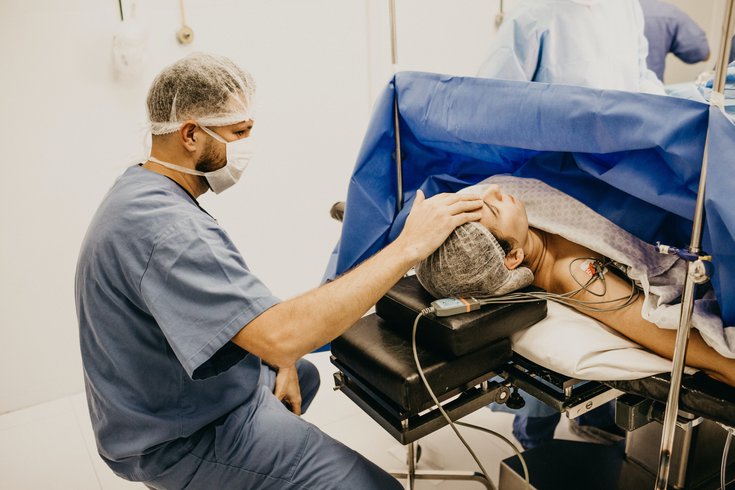
October 11, 2021
 Jonathan Borba/Unsplash
Jonathan Borba/Unsplash
Research has found severe COVID-19 is linked to various pregnancy complications, including pre-term birth, cesarean delivery, postpartum hemorrhage and hypertensive disorders – especially for older women with underlying health issues.
One of the biggest questions when the COVID-19 vaccines were first authorized in the United States was whether they would be safe for pregnant women to receive. Since then, ongoing data has shown that the risk risk of COVID-19 complications to a woman and her baby far outweigh any potential side effects from the shots.
One recent study highlights the pregnancy complications that can occur with a COVID-19 infection.
Symptomatic COVID-19 illness was associated with an increased likelihood of needing an emergency cesarean section, researchers found. The children of these mothers also were more likely to need care in a neonatal intensive care unit compared to the babies of mothers who had asymptomatic COVID-19.
"COVID-19 has severe systemic effects on the body, especially symptomatic patients," said lead study author Kristine Lane, a medical student at the University of Texas.
"It is possible that these effects are amplified in pregnant mothers, who have increased fetal and maternal oxygen demands. The decreased oxygenation could contribute to the increase in cesarean deliveries, as well as the possibility that physicians caring for symptomatic patients are cautious of the virus' unpredictable nature, so they proactively recommend a cesarean delivery for medium- to high-risk deliveries."
Other studies also have linked pregnancy complications to severe COVID-19, including pre-term birth, cesarean delivery, postpartum hemorrhage and hypertensive disorders – especially for older women with underlying health issues.
The latest study analyzed data on 101 pregnant women with COVID-19, including 31 with symptomatic infections, who delivered between March 2020 and September 2020.
Of the women with symptomatic infections, 42% had a fever, 39% had a cough, 26% had shortness of breath, 16% had muscle pain, 16% had chills and 10% had chest pain.
Overall, the researchers found that 58% of the symptomatic women delivered in emergency circumstances, compared to 47% of women who had asymptomatic infections. The rates of C-section delivery among the general population is 32%.
Symptomatic infections also were associated with breech birth, decreased fetal movement, too little amniotic fluid, and the slowing or stopping of labor.
These women's children also were more likely to need oxygen support and be admitted to the neonatal intensive care unit. One baby whose mother was symptomatic tested positive for COVID-19 after delivery.
"This study, similarly to other available data, provides evidence regarding the serious health consequences COVID-19, and especially symptomatic COVID-19 infection, has on the pregnant patient and her newborn child," Dr. Eran Bornstein, vice chairman of obstetrics at Lenox Hill Hospital in New York City, told U.S. News & World Report. Bornstein was not involved in the study.
The U.S. Centers for Disease Control and Prevention recommends that all pregnant women get vaccinated against COVID-19 to protect themselves and their newborn children. Studies have shown that pregnant women have an increased risk of getting severely ill with COVID-19, including the likelihood of hospitalization, intensive care unit admission, extracorporeal membrane oxygenation treatment and death.
Data recently released by the CDC on the effects of the Pfizer and Moderna vaccines on pregnancy show no safety concerns for pregnant women and their babies.
Another report taken from the v-safe pregnancy registry also shows no increased risk for miscarriage in pregnant women who were vaccinated before 20 weeks of pregnancy. Animal studies on the Moderna, Pfizer and Johnson & Johnson vaccines didn't find any safety concerns related to pregnancy either.
The CDC is continuing to follow vaccinated women during all trimesters of pregnancy to better understand the effects on pregnancy and babies.
The latest study's findings were presented at the virtual 2021 annual meeting of the American Society of Anesthesiologists. The research is considered preliminary until published in a peer-reviewed journal.